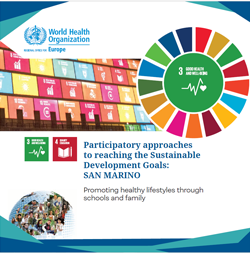San Marino. Promoting healthy lifestyles through schools and family (2019)

Download
In San Marino, the intersectoral approach to improving population health is a long-standing tradition. Several intersectoral projects have been underway for some time with a focus on the achievement of the SDGs, their overall aim being to enhance population health and well-being. In 2013, the Health and school working group was established to promote a systematic approach to health education. The aim is to create a school system in which everyone involved works together to provide students with a safe and healthy environment and positive experiences, and to promote a more sustainable and fairer lifestyle. Such an environment, involving both families and communities, is needed in tackling the burden of noncommunicable and chronic diseases and their risk factors. The adoption of the 2030 Agenda in 2015 gave San Marino the impetus to create the Intersectoral working group on implementation of the SDGs. Comprising representatives of all government departments, this working group is tasked with preparing the voluntary national review (VNR) for submission to the High Level Political Forum (HLPF) in 2019.
San Marino has also set up a strategic platform entitled, “Produce health and development”, to promote intersectoral policies and multipartner cooperation and provide leadership of the WHO Small Countries Initiative in conjunction with the WHO European Centre for Investment for Health and Development, Venice, Italy, of the WHO Regional Office for Europe. The action reported in this briefing is directly linked to SDG 3 (good health and well-being), targets 3.4 and 3.5, and SDG 4 (quality education), target 4.7, and the strategic directions of the WHO European Roadmap to implement the 2030 Agenda for Sustainable Development building on Health 2020, the European policy for health and well-being (advancing governance and leadership for health and well-being, preventing disease and addressing health determinants by promoting multi- and intersectoral policies throughout the lifecourse, and establishing healthy places, settings and resilient communities).



